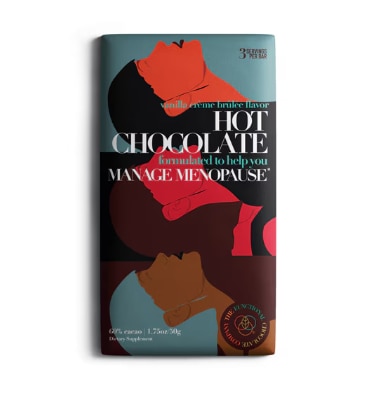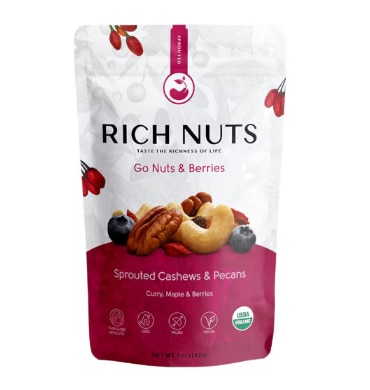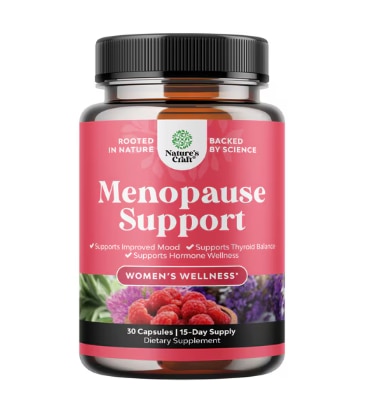Menopause has gone from a subject shrouded in secrecy to one of the hottest topics of the 2020s. Halle Berry has candidly discussed her misdiagnosis and experiences. Oprah Winfrey dedicated hours to the topic and paved the way for a no-holds-barred ethos. #menopause videos have received more than a billion views on TikTok. Michelle Obama is frank about her “furnace-like” hot flashes, and, in 2023, Congresswomen Debbie Lesko and Yvette Clark presented the Menopause Research and Equity Act to Congress—a bill that requires the National Institutes of Health (NIH) to promote research on menopause, perimenopause and women’s mid-life wellness.
Thank the stars for it all, as it’s allowed the 1.3 million U.S. women transitioning into menopause annually to more easily navigate its most stubborn symptoms, including “meno belly,” brain fog and night sweats.

If there’s one thing occasionally missing from the conversation, though, it’s what types of foods women undergoing this era should patently shun.
With this in mind, we’ve rounded up 5 of the most aggravating eats that affect women during perimenopause and menopause, why they spur a reaction…and what you should pile your plate with instead.
The Menopause Diet: Foods That Aggravate Symptoms
1. Sugar-laden eats
Sure, we all know sugar isn’t the most virtuous item to add to our grocery carts, let alone our daily diets. Myths suggesting the sweet stuff is as addictive as drugs might have been debunked, but everything from Reese’s Pieces to a seemingly-benign cup of strawberry yogurt may provoke menopause’s most uncomfortable symptoms. Here’s how:
Research illustrates that sugar may trigger chronic inflammation. While this is concerning at any age, it takes on next-level significance during perimenopause and menopause.
Why?
Inflammation may prompt some of this phase’s most troubling side effects, including fatigue and hot flashes. What’s more, inflammation has been unequivocally linked to a higher risk of cardiovascular disease and the progression of nonalcoholic fatty liver disease, which women have a heightened vulnerability to in menopause.
Excess sugar may also lead to insulin resistance. The problems behind this are three-fold: Insulin resistance may contribute to the onset of obesity and metabolic diseases, such as type 2 diabetes. It can also contribute to menopausal bloating, frequent urination and blurred vision. At the same time, plummeting estrogen—particularly estradiol—may hinder insulin function and result in elevated blood sugar levels. This may give rise to a host of health issues, including neuropathy, gastroparesis and stroke.
What goes up must also come down: The “high’ sugar provides eventually leads to a wicked crash. This may be profoundly felt by women who are already battling the mood swings and sleep disturbances that often accompany menopause.
What to eat instead:
Speaking of psychological shifts: Perimenopause and menopause are largely marked by mood swings and other mental health challenges that seem to arrive out of nowhere. The blues, irritability, anxiety, even panic attacks—all are commonplace as your period nears its end.
In other words? Cravings for brownies, cupcakes and pumpkin spice anything may skyrocket as your hormones spike and plummet, and your brain searches for something to uplift your serotonin and dopamine levels.
To counter those urges (and feel better to boot), consider relishing nutrient-dense sweets instead, such as:
- Medjool dates, topped with all-natural, sugar-free organic peanut butter. Not only do Medjool dates naturally support healthy digestion (a boon for those who are plagued with menopausal bloat), but they’re also jam-packed with antioxidants. Meanwhile, peanut butter is rich in protein, vitamin E and magnesium—a mighty mineral that organically promotes a calmer mood and a better night’s sleep.
- Chia pudding, crowned with blueberries, bananas and cinnamon. Chia is a nutritional powerhouse: The seeds of Salvia hispanica brim with Omega-3 fatty acids, iron, phosphorous and zinc (all of which encourage improved overall health), while blueberries and bananas supply a huge dose of antioxidants and potassium, respectively. Further, recent research shows that cinnamon may dampen the intensity of menopause symptoms.
- Quality dark chocolate, such as Endangered Species’ Strong + Velvety Dark Chocolate Bar. Featuring a mere three grams of sugar per serving, this superior sweet treat offers heart-healthy fats like oleic acid, flavonoids and copper—a trace element that may help preserve collagen and elastin (the very things you need to maintain healthy, youthful skin in menopause and beyond).
2. Processed meats
Even the cleanest eaters among us might be swayed by the mere sight of a juicy BLT.
And yet, processed meats, such as sausage, salami, deli meats, ham and, yes, bacon, are chockful of sodium, saturated fat, nitrites and nitrates, which can magnify menopause symptoms by further disrupting your hormone equilibrium and contributing to both water retention and weight gain.
Even more concerning? Research indicates that red and processed meats may heighten your vulnerability to depression—a clinical mental health condition that effects as many as 35.6 percent of menopausal women around the world. Further, processed meats may up your chances of developing colorectal and stomach cancer.
What to eat instead:
Have a hankering for a salty protein that will leave you sated?
Reach for seafood, nuts and seeds instead. Salmon, anchovies, mackerel, pumpkin seeds, flaxseeds and walnuts boast ample amounts of Omega-3 fatty acids. Preliminary research shows that these “healthy fats” demonstrate promise in alleviating menopause-related:
- Depression
- Mood disturbances and anxiety
- Sleep issues
- Night sweats
Equally enticing? Omega-3 fatty acids have anti-inflammatory effects on the skin and may soften the signs of aging—a key concern for women in menopause, who might experience thin, dry skin and the fine lines and wrinkles that come with it.
3. Spicy foods
Salsa, jalapenos, five-alarm chili, Sriracha-drenched wings, Phaal curry—all may be scrumptious. Yet, overloading on these flavorful eats may work against your desire to beat back night sweats and hot flashes.
Identified as one of the biggest triggers for these vasomotor menopause symptoms, spicy dishes might increase your body temperature and leave you soaked in sweat and searching for a fan.
What’s more, spicy foods may damage the lining of your stomach and bring on nausea, diarrhea, bloating and cramps.
What to eat instead:
If you frequently find yourself feeling overheated, whether it’s the middle of the day or the middle of a (sleepless) night, turn down your inner incinerator by seeking out cooling foods. Cucumbers, celery, cilantro, watermelon, cantaloupe, mangos and citrus help moderate body temperature while supplying you with vitamins, minerals, antioxidants—and a healthy hit of hydration while they’re at it.
4. Alcohol
A mounting body of research reveals that women are more vulnerable to the dark side of alcohol than men. Not only are women dying from alcohol-associated deaths at a swifter pace than their male counterparts, but they’re also more prone to alcohol-induced emergency room visits and hospitalizations. At the same time, drinking even a moderate amount of alcohol—whether you fancy a glass of Prosecco or a martini after a long day’s work—may increase your susceptibility to:
- Breast cancer
- Anxiety and depression
- Cardiovascular disease
- Liver disease
- Osteoporosis
If that’s not reason enough to order a mocktail on your next night out, consider this: Alcohol may deepen the severity of menopause symptoms.
For one, alcohol is notorious is for wreaking havoc on sleep (yes, even if its tranquilizing effects help you feel ready to hit the sheets after your second glass of rosé). This is primarily due to the fact that alcohol delays, limits and/or inhibits Rapid Eye Movement (REM) sleep—or the vital stage of rest in which memories are consolidated, emotions are processed, and your cells are repaired. Bear in mind, too, that menopause in and of itself may give rise to fragmented, poor sleep and insomnia.
In addition, your liver, the organ chiefly responsible for breaking down and eliminating alcohol from your system, becomes less robust with age. This, combined with the imperative role your liver plays in estrogen metabolism, can result in compounded hormone-related menopause symptoms, including hot flashes, night sweats and brain chemistry—the latter of which may escalate menopause-related mental health complications.
Finally, alcohol may precipitate unwanted weight gain and compel you to indulge in less-than-optimal eats.
What to eat (or, rather, drink) instead:
Fortunately, non-alcoholic beverages abound. Many are just as tantalizing as their boozy relatives; several are also filled with wellness benefits, such as:
- Virgin bloody Marys: Concoct your own version of this Sunday brunch favorite by mixing organic tomato juice with a squeeze of lemon, a dash of Worcestershire sauce, horseradish and celery seed. (Skip the cayenne pepper and shot of tabasco, per #3.) Sneak in an extra measure of nutrients by garnishing your drink with a celery stick, a lime wedge and green olives.
- Non-alcoholic kombucha: Kombucha has soared to celebrity status in recent years, thanks to the bevy of health-boosting profits it offers. Technically a tea that’s been infused with yeast, sugar and good bacteria, the trendy beverage has an abundant amount of: antioxidants, polyphenols and acetic acid.
Acetic acid in particular, which can be found in apple cider vinegar, may be especially helpful for menopause symptoms: Research demonstrates that the tart elixir may support a healthy weight, help support blood sugar levels and foster a dewier complexion.†
5. Refined carbohydrates
Refined carbohydrates have received a bad rap for a good cause: Foods ranging from waffles and flour tortillas to pizza dough and crackers typically undergo processing that zaps them of their nutritional value while potentially adding inches to your waistline. Indeed, in addition to unwelcome weight gain, refined carbs may:
- Cause women to enter perimenopause at a younger age (what’s known as premature and early menopause).
- Raise your risk of insulin resistance
- Lead to unstable blood sugar levels
- Enhance food cravings
- Contribute to systemic inflammation
Also, refined sugars—much like the sugar-laden sweets discussed above—cause surges and plunges, potentially making you feel even testier and more harried than usual.
What to eat instead:
In a word: Legumes.
A family of foods from the Fabacea clan, legumes took center stage when research published in the January 2023 issue of Menopause found that women who upped their consumption of them for twelve weeks experienced 88 percent fewer hot flashes.†
Additionally, legumes and other beans—such as black beans, pinto beans, chickpeas, lentils, peas, navy beans, pinto beans, alfalfa, and peanuts (which is in fact not a nut but a legume)—have the capacity to:
- Enrich feelings of satiety and promote an ideal weight
- Keep blood sugar levels in check
- Stabilize hormones
- Nurture smooth, hydrated skin
Another enormous advantage of swapping French fries for steamed edamame?
Many legumes contain isoflavones, which organically encourage deep, quality sleep. Legumes like chickpeas and peanuts also possess tryptophan—an essential amino acid that functions as a precursor to serotonin production. To phrase it differently? Snacking on celery dipped in hummus may not just satisfy your yen for a crunchy, delicious treat: It might also uplift a “hormonal” mood and bring a lasting smile to your face.
†These statements have not been approved by the Food and Drug Administration. These products are not intended to diagnose, treat, cure or prevent disease.
Featured Products



The post The Menopause Diet: 5 Foods to Avoid – and What to Eat Instead – for Relief first appeared on The Upside by Vitacost.com.
